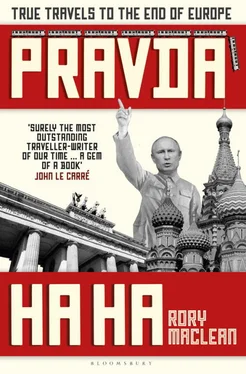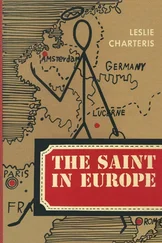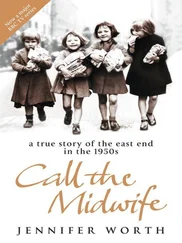Rory MacLean
PRAVDA HA HA
TRUE TRAVELS TO THE END OF EUROPE
Pravda(Правда) n . 1. Truth. 2. Disposition to speak or act truly or without deceit; truthfulness, veracity, sincerity [- Russ. э́то прáвда? Is it true?] 3. Russian broadsheet newspaper, formerly the official newspaper of the Communist Party of the Soviet Union [f. Proto-Slavic pravьda , from pravъ = right, correct]
‘But I tell you, Winston, that reality is not external. Reality exists in the human mind, and nowhere else… Whatever the Party holds to be the truth, is truth.’
George Orwell,
Nineteen Eighty-Four
Underground there was no horizon. Underground the people moved in halting steps, moved as one, moved four abreast to ride down, deep down beneath the city. The earth swallowed them, corralled them, unnamed them as the metallic shriek rose up to strike them dumb. No one talked above the whine of the motors. No one stood out. Once or twice the odd traveller dared to shout, leaning towards his fellows, his warm breath brushing their ears. Otherwise the mass – ten million souls every day – moved through the deafening noise, unable or unwilling to be heard.
I stepped among them, shuffled with them down the banks of escalators to the platform. In the pale milky light waited office clerks and stallholders, weary shop cleaners and crisp police recruits, pedlars with sacks of tourist tat and widows in frumpy Soviet dresses who’d seen their sons shot dead in the chaos after capitalism’s triumph. Two hundred feet below ground the surging crowd elbowed aside a frightened, almond-eyed Yakut woman. Three white policemen approached her, backed her against the wall, demanded identity papers with a gesture that needed no words. Another traveller, a sharp-nosed Uzbek with his furious moustache, shepherded his young son around them without a look. The boy carried a plastic Russian flag. The scream of brakes echoed off the cold Crimean marble.
At peak times the trains arrived every minute at every one of Moscow’s 224 underground stations, grating to a stop, flinging open their gaping doors, sucking in the bydlo . That’s what Moscow’s elite call the common people, the countless commuting offspring of provincial peasants, the rabble from the city’s margins who’ll never stand tall, never escape the shadows. Bydlo . Proles. Cattle. Scum.
At Taganskaya the throng heaved itself off the platform, carrying me with it into the metal carriage, crushing me against three identikit blondes. The women – slender and curvy with violet nails and long straightened hair – batted me away with their lashes. A buffed twentysomething in T-shirt and jeans carried his crumpled security guard uniform in a plastic bag. Beside him a grey-haired, grey-skinned academic noted his earnings in a diary, a leaky biro stain on his threadbare pinstripe. On a seat behind them a bricklayer at the end of his shift squinted at two ancient Nokias nestled like matchboxes in his big hands, his sausage fingers punching out the wrong number on one of them again and again.
Then I saw the bird.
It came out of nowhere, flying in through a closing door, inches above our heads. It was starling-sized and short-tailed with buff-grey plumage. As the train accelerated out of the station, I guessed that it had flown down into the underground – above the escalators’ deep rolling rumble – and become trapped. Two men tried to grab it. The identikit blondes shrieked and ducked their heads. A stocky youth in bow tie began to swat at it with a folded newspaper. Other passengers held his arm, started to laugh, to yell, gazing in awe at the beautiful, frightened creature as it swept back and forth through the snaking carriages, shitting on the head of the failed academic in its terror.
Next the strangest thing happened.
After half a dozen fast flights, somewhere between Taganskaya and Kurskaya, the bird realised that there was no escape. Quite suddenly it stopped flying, and perched on a young man’s shoulder by the door. He seemed to be a random choice, not distinctive at first glance, neither handsome nor bad-looking either: slight build, tracksuit top and high, chiselled cheekbones under deep brown eyes. Not exceptional at all, apart from his stack of hair, his unruffled calm, and being black in Moscow.
The man’s stillness, and the frailty of the bird’s trembling chestnut breast, brought a sudden serenity to the carriage. Commuters stared at the astonishing sight, met each other’s glances, took hardly a breath so as not to break the spell, oblivious to the rising squeal of the brakes as the train slowed to pull into the next station. When the doors opened no one moved, until the man jerked backwards out of the carriage and onto the platform. Then the bird took off, its long flight feathers flashing with red and yellow tips.
I stared as well, before shaking myself out of my reverie. I wanted to follow him, to get off the train. I searched for my voice. ‘Are you getting off now?’ I said, pushing against the blondes. Vy seichas vykhodite? Let me off. But no one heard me, no one looked up as the crush of incoming passengers blocked my exit, entombing me again. Too soon the doors slammed shut and both man and bird were gone. With a scream the train plunged back into a darkness beyond which there was no horizon, no distant hill, no grand shadow cast in sudden valleys, only longsome tunnels that led from sleep to work and back again, day after day, night upon night.
‘She told you about mushroom?’ said Dmitri Denisovich with a swift intake of breath.
‘I want to taste the mushroom,’ I told him again.
Russia’s chicken tsar fixed his hooded blue eyes on me. He leaned forward in his graphite Aeron office chair. I held his gaze. He obviously hadn’t expected my request. Beyond his panoramic window a jet-black helicopter climbed into the cloudless summer sky. The Kremlin’s teeth-like crenellations took a bite out of the firmament.
‘No problem,’ he said with forced nonchalance, not breaking the stare. His vowels were dark, his voice as thick as tar. ‘One million dollars…’ he added, twisting the diamond ring on his finger. I could hear the cogs whirring and crunching in his brain. ‘…Or one book.’
Dmitri Denisovich meant business. A week earlier our mutual friend had called him from the balcony of her London penthouse, gazing out over Regent’s Park, and asked him to look after me. Russian hospitality may be legendary but Dmitri had refused her, until she’d mentioned that I was a writer.
‘One book?’ I asked him, not having a million dollars to hand. ‘What do you mean?’
‘We make deal and you enjoy mushroom,’ he said again in fractured English, waving away my question, leaving too much unsaid. ‘No problem, my friend. I like you.’
There was something magnetic about Dmitri, something mercurial and seriously shady too. He seemed unable to keep still, cracking his neck, rolling his shoulders, rising to his feet to prowl around his plush burgundy office, like a caged beast in Givenchy. He was bigger than I’d expected, and better dressed. His trim blazer and flashy floral shirt hinted at both flair and vulgarity. His black hair was crew-cut short. I guessed that he was on the cusp of fifty.
Читать дальше


![Эдвард Докс - Pravda ['Self Help' in the UK]](/books/33503/edvard-doks-pravda-self-help-in-the-uk-thumb.webp)










